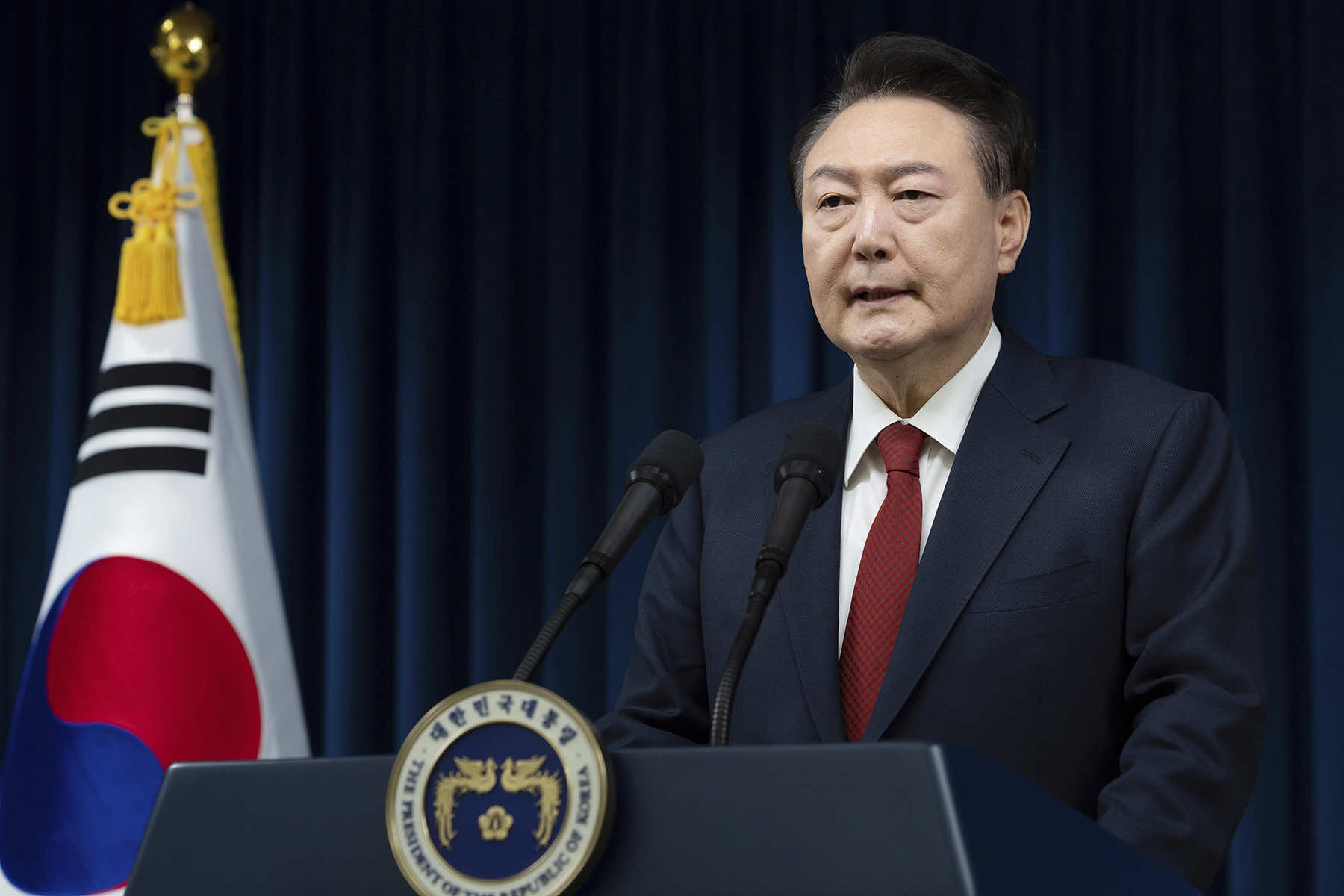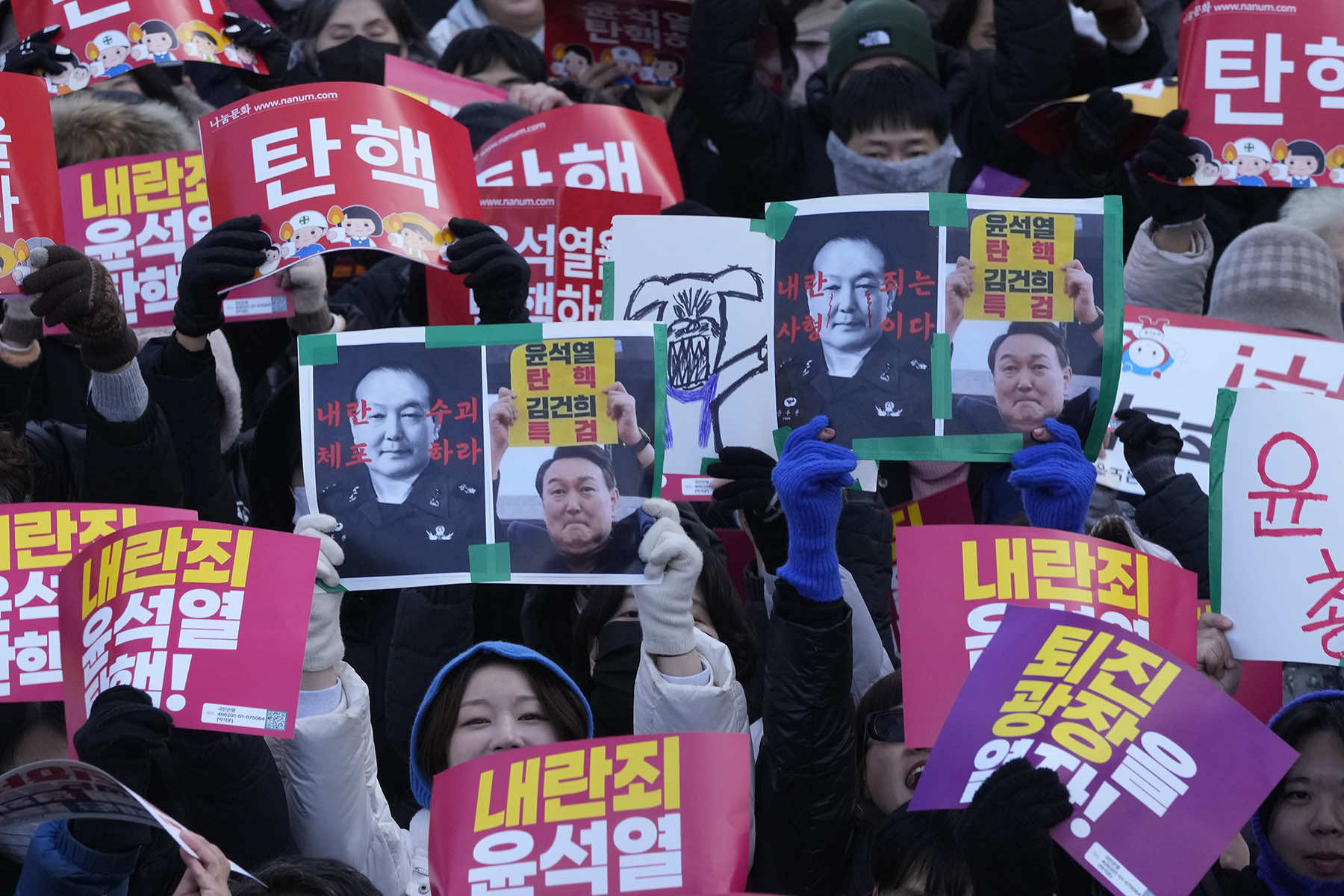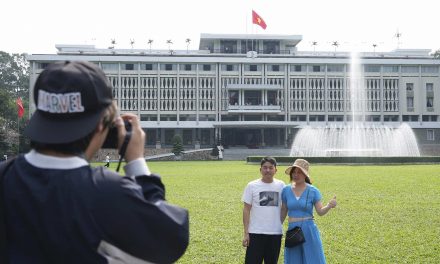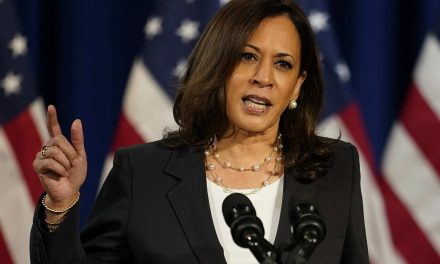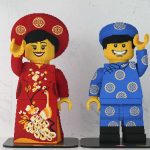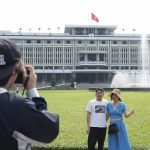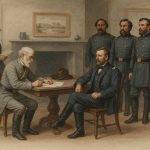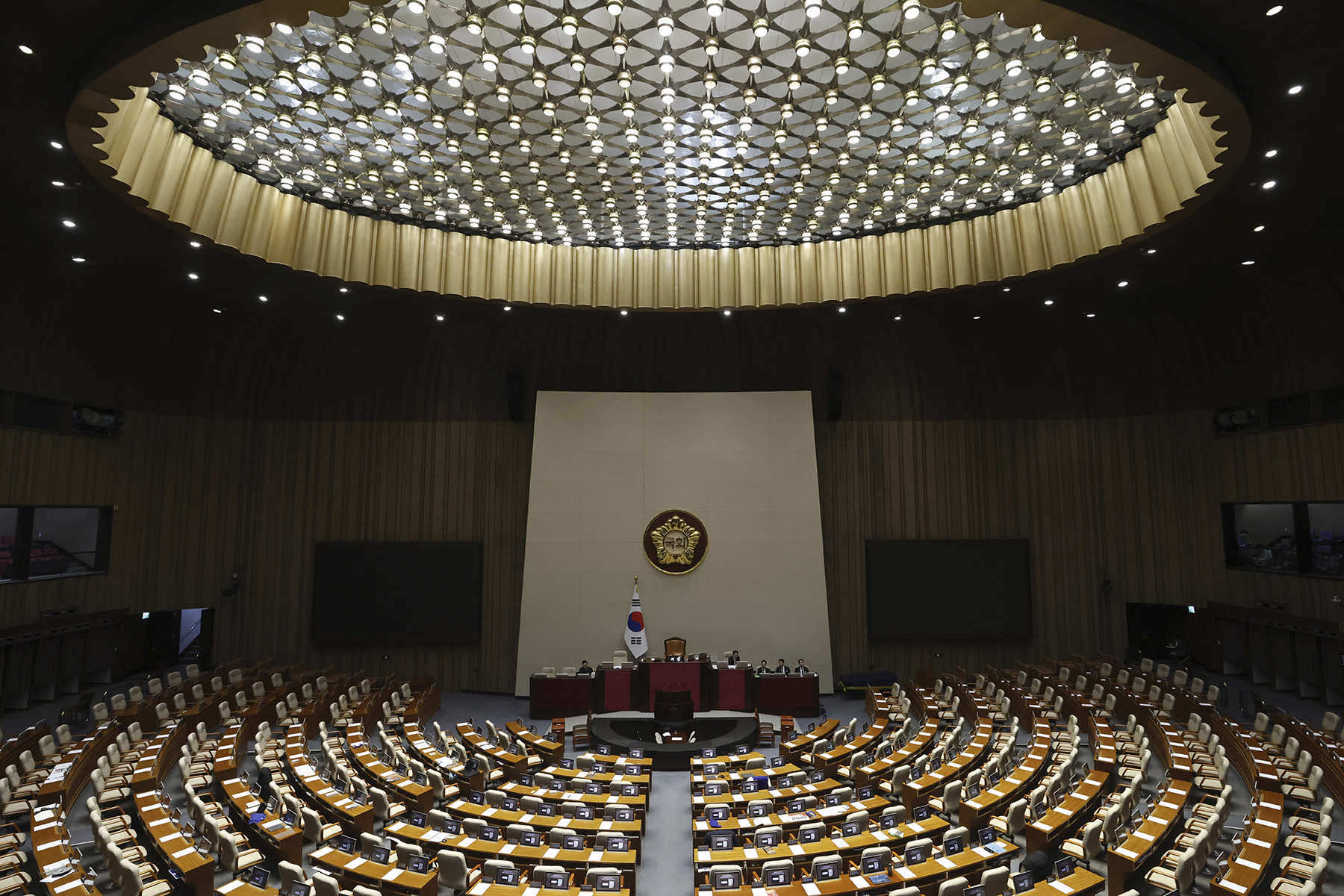
South Korean President Yoon Suk Yeol appeared poised to survive an impeachment attempt after lawmakers from the ruling party staged a boycott of the special parliamentary session on December 7.
Many legislators departed the chamber ahead of the scheduled vote that was triggered by Yoon’s brief declaration of martial law on December 3. With fewer than the required 200 members present.
The motion to impeach Yoon requires two-thirds support to pass. The opposition parties that jointly brought the impeachment motion control 192 of the legislature’s 300 seats. At least eight additional votes from Yoon’s People Power Party would be required for a majority.
Outside the main hall, opposition lawmakers angrily urged their colleagues to return, shouting “Go inside!” and branding them “cowards.”
The earliest the legislature could attempt another impeachment vote would be on December 11.
South Korean lawmakers gathered in the National Assembly hours after Yoon issued a public apology over the move, saying he would not shirk legal or political responsibility for the declaration and promising not to make another attempt to impose martial law.
In a brief televised address, Yoon said he would leave it to his party to chart a course through the country’s political turmoil, “including matters related to my term in office.”
“The declaration of this martial law was made out of my desperation. But in the course of its implementation, it caused anxiety and inconveniences to the public. I feel very sorry over that and truly apologize to the people who must have been shocked a lot,” Yoon said.
Since taking office in 2022, Yoon, a conservative, has struggled to push his agenda through an opposition-controlled parliament and grappled with low approval ratings amid scandals involving himself and his wife. In his martial law announcement on December 3, Yoon called parliament a “den of criminals” bogging down state affairs and vowed to eliminate “shameless North Korea followers and anti-state forces.”
Lawmakers on December 7 first voted on a bill appointing a special prosecutor to investigate stock price manipulation allegations surrounding Yoon’s wife. Some lawmakers from Yoon’s party were seen leaving the hall after that vote, triggering angry shouts from opposition lawmakers.
If Yoon is impeached, his powers will be suspended until the Constitutional Court decides whether to remove him from office. If he is removed, an election to replace him must take place within 60 days.
The turmoil resulting from Yoon’s bizarre and poorly-thought-out stunt has paralyzed South Korean politics and sparked alarm among key diplomatic partners, including neighboring Japan and Seoul’s top ally the United States, as one of the strongest democracies in Asia faces a political crisis that could unseat its leader.
The night of December 3 saw special forces troops encircling the parliament building and army helicopters hovering over it, but the military withdrew after the National Assembly unanimously voted to overturn the decree, forcing Yoon to lift it before daybreak on December 4. The declaration of martial law was the first of its kind in more than 40 years in South Korea.
Seemingly tens of thousands of people packed streets near the National Assembly, waving banners, shouting slogans and dancing and singing along to K-pop songs with lyrics changed to call for Yoon’s ouster. The protests were growing late on December 7, with subway trains not stopping at the stations near the Assembly because of the sudden increase in crowds.
A smaller crowd of Yoon’s supporters, which still seemed to be in the thousands, rallied in separate streets in Seoul, decrying the impeachment attempt they saw as unconstitutional.
Opposition lawmakers say that Yoon’s attempt at martial law amounted to a self-coup, and drafted the impeachment motion around rebellion charges.
Lee Jae-myung, the leader of the main liberal opposition Democratic Party, told reporters that Yoon’s speech was “greatly disappointing” and that the only way forward is his immediate resignation or impeachment.
It was not clear if members of Yoon’s PPP would break ranks to vote for impeachment. Eighteen lawmakers from a minority faction of the party joined the unanimous vote to cancel martial law, which passed 190-0. However, the party has decided to oppose the impeachment.
Experts say the PPP fears Yoon’s impeachment and possible removal from office would leave the conservatives in disarray and easily losing a presidential by-election to liberals.
On December 6, PPP chair Han Dong-hun, who also heads the minority faction that helped cancel martial law, called for suspending Yoon’s constitutional powers, describing him as unfit to hold the office and capable of taking more extreme actions. But Han is not a lawmaker and the party’s position remains anti-impeachment.
Han said he had received intelligence that during the brief period of martial law Yoon ordered the country’s defense counterintelligence commander to arrest and detain unspecified key politicians based on accusations of “anti-state activities.”
Following Yoon’s televised address, Han reiterated his call for him to step down, saying that the president wasn’t in a state where he could normally carry out official duties. “President Yoon Suk Yeol’s early resignation is inevitable,” Han told reporters.
Hong Jang-won, first deputy director of South Korea’s National Intelligence Service, later told lawmakers in a closed-door briefing that Yoon called after imposing martial law and ordered him to help the defense counterintelligence unit to detain key politicians. The targeted politicians included Han, Lee and National Assembly speaker Woo Won Shik, according to Kim Byung-kee, one of the lawmakers who attended the meeting.
The Defense Ministry said it had suspended the defense counterintelligence commander, Yeo In-hyung, who Han alleged had received orders from Yoon to detain the politicians. The ministry also suspended the commanders of the capital defense command and the special warfare command over their involvement in enforcing martial law.
Former Defense Minister Kim Yong Hyun, who has been accused of recommending Yoon enforce martial law, has been placed under a travel ban and faces an investigation by prosecutors over rebellion charges.
Vice Defense Minister Kim Seon Ho has testified to parliament that it was Kim Yong Hyun who ordered troops to be deployed to the National Assembly after Yoon imposed martial law.
- Exploring Korea: Stories from Milwaukee to the DMZ and across a divided peninsula
- A pawn of history: How the Great Power struggle to control Korea set the stage for its civil war
- Names for Korea: The evolution of English words used for its identity from Gojoseon to Daehan Minguk
- SeonJoo So Oh: Living her dream of creating a "folded paper" bridge between Milwaukee and Korean culture
- A Cultural Bridge: Why Milwaukee needs to invest in a Museum that celebrates Korean art and history
- Korean diplomat joins Milwaukee's Korean American community in celebration of 79th Liberation Day
- John T. Chisholm: Standing guard along the volatile Korean DMZ at the end of the Cold War
- Most Dangerous Game: The golf course where U.S. soldiers play surrounded by North Korean snipers
- Triumph and Tragedy: How the 1988 Seoul Olympics became a battleground for Cold War politics
- Dan Odya: The challenges of serving at the Korean Demilitarized Zone during the Vietnam War
- The Korean Demilitarized Zone: A border between peace and war that also cuts across hearts and history
- The Korean DMZ Conflict: A forgotten "Second Chapter" of America's "Forgotten War"
- Dick Cavalco: A life shaped by service but also silence for 65 years about the Korean War
- Overshadowed by conflict: Why the Korean War still struggles for recognition and remembrance
- Wisconsin's Korean War Memorial stands as a timeless tribute to a generation of "forgotten" veterans
- Glenn Dohrmann: The extraordinary journey from an orphaned farm boy to a highly decorated hero
- The fight for Hill 266: Glenn Dohrmann recalls one of the Korean War's most fierce battles
- Frozen in time: Rare photos from a side of the Korean War that most families in Milwaukee never saw
- Jessica Boling: The emotional journey from an American adoption to reclaiming her Korean identity
- A deportation story: When South Korea was forced to confront its adoption industry's history of abuse
- South Korea faces severe population decline amid growing burdens on marriage and parenthood
- Emma Daisy Gertel: Why finding comfort with the "in-between space" as a Korean adoptee is a superpower
- The Soul of Seoul: A photographic look at the dynamic streets and urban layers of a megacity
- The Creation of Hangul: A linguistic masterpiece designed by King Sejong to increase Korean literacy
- Rick Wood: Veteran Milwaukee photojournalist reflects on his rare trip to reclusive North Korea
- Dynastic Rule: Personality cult of Kim Jong Un expands as North Koreans wear his pins to show total loyalty
- South Korea formalizes nuclear deterrent strategy with U.S. as North Korea aims to boost atomic arsenal
- Tea with Jin: A rare conversation with a North Korean defector living a happier life in Seoul
- Journalism and Statecraft: Why it is complicated for foreign press to interview a North Korean defector
- Inside North Korea’s Isolation: A decade of images show rare views of life around Pyongyang
- Karyn Althoff Roelke: How Honor Flights remind Korean War veterans that they are not forgotten
- Letters from North Korea: How Milwaukee County Historical Society preserves stories from war veterans
- A Cold War Secret: Graves discovered of Russian pilots who flew MiG jets for North Korea during Korean War
- Heechang Kang: How a Korean American pastor balances tradition and integration at church
- Faith and Heritage: A Pew Research Center's perspective on Korean American Christians in Milwaukee
- Landmark legal verdict by South Korea's top court opens the door to some rights for same-sex couples
- Kenny Yoo: How the adversities of dyslexia and the war in Afghanistan fueled his success as a photojournalist
- Walking between two worlds: The complex dynamics of code-switching among Korean Americans
- A look back at Kamala Harris in South Korea as U.S. looks ahead to more provocations by North Korea
- Jason S. Yi: Feeling at peace with the duality of being both an American and a Korean in Milwaukee
- The Zainichi experience: Second season of “Pachinko” examines the hardships of ethnic Koreans in Japan
- Shadows of History: South Korea's lingering struggle for justice over "Comfort Women"
- Christopher Michael Doll: An unexpected life in South Korea and its cross-cultural intersections
- Korea in 1895: How UW-Milwaukee's AGSL protects the historic treasures of Kim Jeong-ho and George C. Foulk
- "Ink. Brush. Paper." Exhibit: Korean Sumukhwa art highlights women’s empowerment in Milwaukee
- Christopher Wing: The cultural bonds between Milwaukee and Changwon built by brewing beer
- Halloween Crowd Crush: A solemn remembrance of the Itaewon tragedy after two years of mourning
- Forgotten Victims: How panic and paranoia led to a massacre of refugees at the No Gun Ri Bridge
- Kyoung Ae Cho: How embracing Korean heritage and uniting cultures started with her own name
- Complexities of Identity: When being from North Korea does not mean being North Korean
- A fragile peace: Tensions simmer at DMZ as North Korean soldiers cross into the South multiple times
- Byung-Il Choi: A lifelong dedication to medicine began with the kindness of U.S. soldiers to a child of war
- Restoring Harmony: South Korea's long search to reclaim its identity from Japanese occupation
- Sado gold mine gains UNESCO status after Tokyo pledges to exhibit WWII trauma of Korean laborers
- The Heartbeat of K-Pop: How Tina Melk's passion for Korean music inspired a utopia for others to share
- K-pop Revolution: The Korean cultural phenomenon that captivated a growing audience in Milwaukee
- Artifacts from BTS and LE SSERAFIM featured at Grammy Museum exhibit put K-pop fashion in the spotlight
- Hyunjoo Han: The unconventional path from a Korean village to Milwaukee’s multicultural landscape
- The Battle of Restraint: How nuclear weapons almost redefined warfare on the Korean peninsula
- Rejection of peace: Why North Korea's increasing hostility to the South was inevitable
- WonWoo Chung: Navigating life, faith, and identity between cultures in Milwaukee and Seoul
- Korean Landmarks: A visual tour of heritage sites from the Silla and Joseon Dynasties
- South Korea’s Digital Nomad Visa offers a global gateway for Milwaukee’s young professionals
- Forgotten Gando: Why the autonomous Korean territory within China remains a footnote in history
- A game of maps: How China prepared to steal Korean history to prevent reunification
- From Taiwan to Korea: When Mao Zedong shifted China’s priority amid Soviet and American pressures
- Hoyoon Min: Putting his future on hold in Milwaukee to serve in his homeland's military
- A long journey home: Robert P. Raess laid to rest in Wisconsin after being MIA in Korean War for 70 years
- Existential threats: A cost of living in Seoul comes with being in range of North Korea's artillery
- Jinseon Kim: A Seoulite's creative adventure recording the city’s legacy and allure through art
- A subway journey: Exploring Euljiro in illustrations and by foot on Line 2 with artist Jinseon Kim
- Seoul Searching: Revisiting the first film to explore the experiences of Korean adoptees and diaspora





